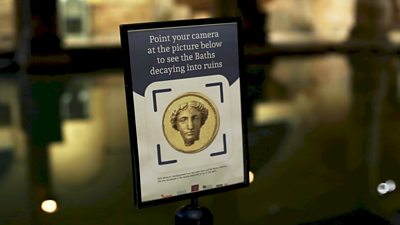
Working with our project partners in the 5G Smart Tourism project, we successfully completed the first public trial of our AR application at the , on the evenings of 10th and 17th December 2018. Over 100 visitors experienced reconstructions of the Baths at key moments in history, on a mobile AR app. High-quality 360 video was streamed over the project鈥檚 network, that included the first UK deployment of a 60GHz mesh network.
As visitors arrived, they were briefed about the event and given a handset to use. As they walked around, they stopped at each of the three locations that had a 鈥榯rigger image鈥� for a particular time period, and used this to launch the experience.
大象传媒 R&D - Research White Paper: Mobile Augmented Reality using 5G
After months of testing in the lab, it was great to see the historical reconstructions 鈥榠n situ鈥�, standing at the actual position that matched the viewpoint into the 3D modelled scene. The high accuracy with which had modelled the Baths made it easy to relate what the app showed to what was directly visible.
大象传媒 R&D - New Audience Experiences for Mobile Devices
大象传媒 R&D - 5G Trials - Streaming AR and VR Experiences on Mobile
All the project partners were very pleased with the performance of the network and the app. Using heterogeneous connectivity technologies including mmWave, fibre and wi-fi, The University of Bristol鈥檚 installed network was able to deliver throughputs in excess of 600Mbps with latencies less than 10ms to handsets in the Roman Baths. CCS were able to validate the new 60GHz mmWave mesh technology in a live real-world environment. The trial helped them understand and prove 60GHz mmWave in dense urban canyons using small-form factor radios in a sensitive and historic city location. The CCS nodes provided the trunk link between the Roman Baths and the Guildhall to the 5G core network, which validated the IP/Ethernet end-to-end interoperability requirements. The live trial generated a large amount of high bandwidth video traffic which the 60GHz mesh was able to deliver, and latency over the mesh was maintained at less than 1ms which is an important 5G performance indicator, setting it apart from existing 4G and LTE.
In addition to performing detailed network performance measurements, we also did a simple comparison between using the project鈥檚 infrastructure and using the Roman Baths鈥� normal visitor WiFi network with data hosted by a commercial cloud provider. It took less than about 1 second for the video to start playing when using the project network, but over 30 seconds when using the existing infrastructure. This isn鈥檛 really indicative of the benefits of 5G specifically over conventional networks but does show that what we were successfully demonstrating was well beyond what the existing infrastructure could easily deliver.
We captured lots of feedback from the visitors and we鈥檙e currently analysing this. However, comments were overwhelmingly positive, with over 80% of the visitors saying that they would be more likely to visit a museum if it offered these kind of experiences.
We鈥檙e looking forward to the next set of trials in March, when we hope to test remote rendering technology.
-
大象传媒 R&D - Research White Paper: Mobile Augmented Reality using 5G
大象传媒 R&D - All of our articles on 4G and 5G including:
大象传媒 R&D - Broadcasting Over 5G - Delivering Live Radio to Orkney
大象传媒 R&D - TV Over Mobile Networks - 大象传媒 R&D at the 3GPP
大象传媒 R&D - 4G Broadcast for the Commonwealth Games 2014
大象传媒 R&D - 4G Broadcast technology trial at Wembley 2015 FA Cup Final
大象传媒 R&D - 4G Broadcast: Can LTE eMBMS Help Address the Demand for Mobile Video?
大象传媒 R&D - 5G Trials - Streaming AR and VR Experiences on Mobile
大象传媒 R&D - New Content Experiences over 5G Fixed Wireless Access
大象传媒 R&D - New Audience Experiences for Mobile Devices
大象传媒 R&D - Unlocking the Potential of 5G for Content Production
-

Immersive and Interactive Content section
IIC section is a group of around 25 researchers, investigating ways of capturing and creating new kinds of audio-visual content, with a particular focus on immersion and interactivity.
-

Future Experience Technologies section
This project is part of the Future Experience Technologies section

